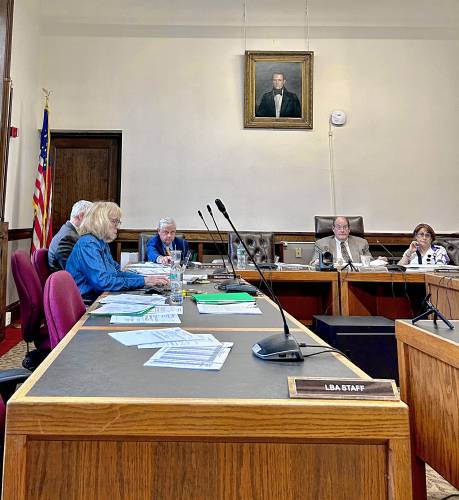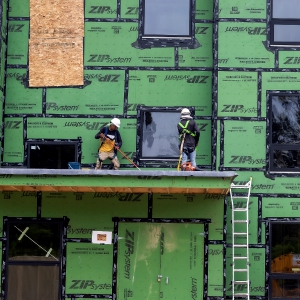N.H. Senate kills school funding bill despite districts, mayors voicing need

State Senators listen to testimony over a school funding bill at a Finance Committee hearing on April 30, 2024. JEREMY MARGOLIS—Monitor staff
|
Published: 05-29-2024 10:26 AM
Modified: 05-29-2024 11:58 AM |
A month after a bipartisan group of state representatives united to pass a bill that would increase state education funding, Democrat and Republican senators came together last week to vote it down.
The legislation, HB 1583, would have increased per-pupil funding from $4,100 to $4,404 for all students and would have increased additional aid by varying amounts.
At a Senate hearing on the bill last month, politicians and superintendents from across the state said their school districts desperately need the additional aid to adequately fund their school districts.
A letter signed by the mayors of 11 of 13 cities in the state, including mayors Byron Champlin of Concord and Desiree McLaughlin of Franklin, called on legislators to pass the bill.
“There is a significant gap between the actual cost of education and what the State of New Hampshire provides to municipalities,” the mayors wrote. “While the state currently provides $4,100 per student in adequacy aid, districts across New Hampshire spend an average of $20,000 per student, with the majority of this difference being shouldered by local property taxpayers.”
But Senators from both parties countered that both the bill’s price tag – an estimated $203.5 million over three years – and its timing – coming in the middle of the biennial budget cycle and amid two consequential school funding lawsuits – were challenges.
“For me, it was a question of timing,” said Sen. Cindy Rosenwald, a Nashua Democrat who opposed the bill. “I had no issue with the content of the bill, but we’re in the middle of an education funding lawsuit that could upend how we pay for education entirely and we’re also in the middle of a budget.”
Last November, a Rockingham Superior Court judge ruled that the current per-student allocation is insufficient, and that it must be increased by at at least $3,000, to $7,356.01. That decision has since been appealed to and accepted by the state’s Supreme Court, though no oral argument date has been set.
Article continues after...
Yesterday's Most Read Articles
 Both remaining Rite Aid stores in Concord slated for closure
Both remaining Rite Aid stores in Concord slated for closure
 A Webster property was sold for unpaid taxes in 2021. Now, the former owner wants his money back
A Webster property was sold for unpaid taxes in 2021. Now, the former owner wants his money back
 Photos: Concord High students strut their stuff at prom
Photos: Concord High students strut their stuff at prom
 State Supreme Court says towns can keep excess school taxes rather than sharing them with poorer towns
State Supreme Court says towns can keep excess school taxes rather than sharing them with poorer towns
 New fair coming next week to Everett Arena in Concord
New fair coming next week to Everett Arena in Concord
 Concord city councilors reconsider their nomination process after appointment backlash
Concord city councilors reconsider their nomination process after appointment backlash
A trial in a second case, which challenges the constitutionality of the state’s education property tax system, is scheduled to begin in September.
School funding disparities have long plagued school districts in New Hampshire and burdened local taxpayers, particularly those in towns with lower property values.
Rep. Jonah Orion Wheeler, a Peterborough Democrat and a bill sponsor, said at the Senate hearing that those disparities were evident during his schooling, when he attended the relatively well-resourced ConVal Regional High School but had friends 10 minutes away in Jaffrey who received fewer educational opportunities at Conant Middle High School.
“I introduced this legislation to try and alleviate that dichotomy,” Orion Wheeler said.
But both Republican and Democrat senators said the state could not afford the fund the bill, in part due to additional expected expenses related to the Youth Development Center funds and changes to state retirement system benefits, which together will cost the state $86 million.
“In light of the YDC settlement and the fix to the retirement group II members, a majority of the committee members cannot justify appropriating more education funding at this time,” Sen. Lou D’Allesandro said last Thursday, before the Senate elected via a voice vote to refer the bill to interim study.
Because there was no roll call, it was not clear how many senators opposed the vote. Senator Regina Birdsell, a Hampstead Republican, was the lone member of the Finance Committee to voice opposition.
“I know that there are some towns that are in need of this, so with that I will be voting against the interim study,” Sen. Birdsell said.
Representative David Luneau, one of the leaders of the House’s bipartisan select committee on school funding, which was convened early this year, expressed disappointment in the Senate’s decision.
“The Senate isn’t strong when it comes to school funding policy,” Rep. Luneau said. “Granite Staters would be better served if the Senate really listened to the bipartisan work done in the House.”
The senators’ rationale for passing on the bill was questioned by Zack Sheehan, the director of the NH School Funding Fairness Project.
“The day before, the Senate – and I know this is more partisan – voted to expand vouchers,” Sheehan said in an interview. “So it’s like on one hand, we don’t have the money, on the other hand, we do have the money for things that we think are a higher priority.”
Jeremy Margolis can be contacted at jmargolis@cmonitor.com.







 New Hampshire school phone ban could be among strictest in the country
New Hampshire school phone ban could be among strictest in the country Concord became a Housing Champion. Now, state lawmakers could eliminate the funding.
Concord became a Housing Champion. Now, state lawmakers could eliminate the funding. ‘A wild accusation’: House votes to nix Child Advocate after Rep. suggests legislative interference
‘A wild accusation’: House votes to nix Child Advocate after Rep. suggests legislative interference  Sununu decides he won’t run for Senate despite praise from Trump
Sununu decides he won’t run for Senate despite praise from Trump
